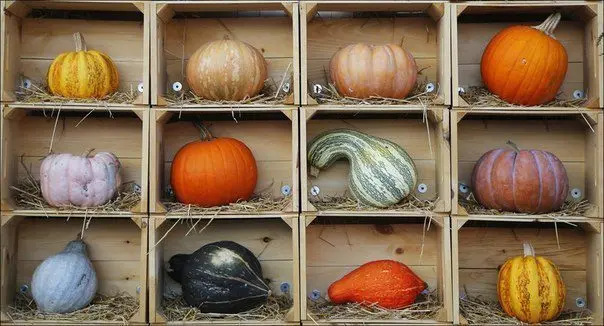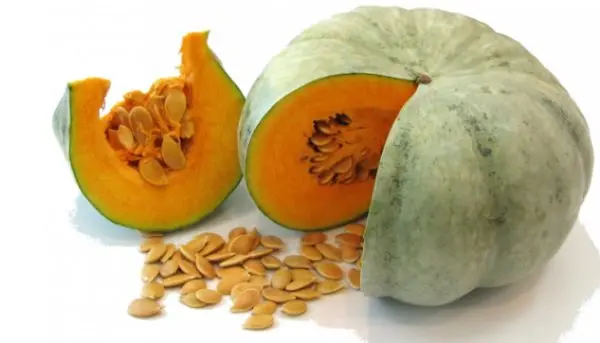😉 Hello dear readers! Autumn has come – the pumpkin season. Today our guest is Mrs. Pumpkin. The article “Pumpkin: Benefits and Harm to Health” contains basic information about this interesting vegetable. Composition and calorie content, benefits and harms to the body. How and where to store.
Pumpkin is not a lonely woman, she has many relatives: squash, zucchini, watermelon, cucumber.
The homeland of Madame Pumpkin is Mexico, and the age of this venerable lady is 8000 years old! It was only in the 16th century that the pumpkin appeared in Europe. This plant has many varieties, differing in color, shape and size of pumpkins. The varieties are divided into three groups:
- Decorative.
- Forage (large-fruited) – for animals.
- Canteens are a valuable food product for humans.

A bright and cozy pumpkin is often found in children’s fairy tales. Think of the pumpkin carriage from Cinderella by Charles Perrault or one of the characters in Cipollino by Gianni Rodari.
Composition and calorie content. In 100 grams of product:
- calories – 26;
- proteins – 1 g;
- fats – 0.1 g;
- carbohydrates – 4,4 g;
- dietary fiber – 2 g;
- water – 91,8 g.
Vitamins: A, beta-carotene, B1, B2, B5, B6, B9, C, E, PP, K. Calcium, magnesium, phosphorus, iron, copper, zinc, potassium, sodium, fluorine, manganese, iodine. Orange squash has five times more beta-carotene than carrots.
Healing properties of pumpkin
- firstly, you can cook tasty and healthy food from pumpkin: cereals, mashed soups, desserts. It can be baked in the oven or fried;
- for skin and eye health (vitamin A);
- participation in maintaining immunity;
- has antioxidant properties;
- prevention of liver disease;
- reduces puffiness;
- preventing the development of cancer;
- if you have a tendency to constipation – eat raw pumpkin or drink juice;
- if inflammatory diseases of the stomach or intestines – boiled pumpkin or stew is recommended;
- pectin removes cholesterol from the body;
- antihelminthic property (raw seeds);
- with burns, a compress from the pulp helps;
- ideal for fasting days and diets. Pumpkin fasting days (no more than 1-2 days a week);
- pumpkin seeds are especially beneficial for men. They contain zinc, which is responsible for the male reproductive system;
- used in cosmetology. Women will definitely appreciate wonderful face masks.
In many countries, pumpkins are used to make Jack’s lamps on Halloween (celebrated on October 31st).
Pumpkin: contraindications
- the presence of an allergic reaction;
- with diabetes mellitus, treat this vegetable with caution;
- pumpkin is contraindicated for diarrhea or bowel disorders;
- do not forget that pumpkin seeds are very high in calories. In 100 grams of grains – 550 kcal, which will be detrimental to people trying to lose those extra pounds.

Where to store pumpkin?
The best place to store this melon culture is the cellar. A cool pantry or a glazed loggia is fine. For long-term storage, choose pumpkins without damage, always with a stalk.
Fruits will be stored longer with the stalk up. If you have multiple “copies”, they should not touch each other during storage.
When storing on a loggia, wrap each pumpkin in a thick cloth from sunlight. In frosty weather, cover the pumpkins with a warm blanket. She’s cold!
There are varieties that will feel great in your apartment (up to three months). Roll the pumpkin under your bed and sleep well!
Cut pumpkin can be stored for up to a month by wrapping it in foil. The pumpkin can be frozen. Dice or grate. Then place in a plastic bag (for freezing food). Store up to 1 year.
Video
Learn more in this video “Pumpkin: health benefits and harms”
Friends, if the article “Pumpkin: benefits and harms to health” was useful to you, share in social networks. 😉 Until next time on the site!









